High Quality Screw Barrel for Co-Rotating Twin Screw Extruder
Â
About product
Different types of screw elements can be used in a twin screw extruder. Generally there are four major types of screw elements, namely conveying elements, kneading elements, backward-pumping elements and mixing elements. For each type there are many different subtypes.
Conveying elements
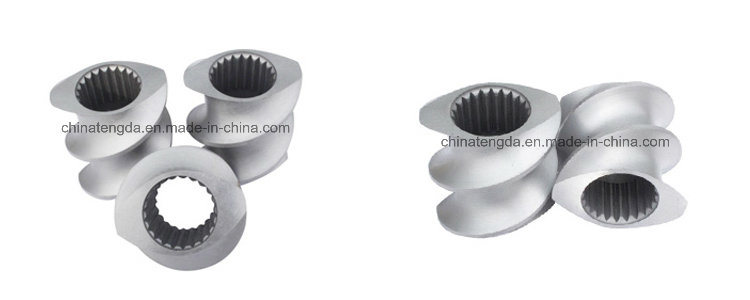
The geometry of the conveying elements enables a good transport of the product through the extruder. Each conveying element is characterized by its number of flights, its length in millimeters, and its pitch. The pitch is defined as the axial length in millimeters, required for a complete thread. Conveying elements with a large pitch have a greater conveying effect than those with a small pitch. These elements are used to forward the material e.g. at feed openings, in order to avoid that pressure increases excessively at the openings.
Kneading elements
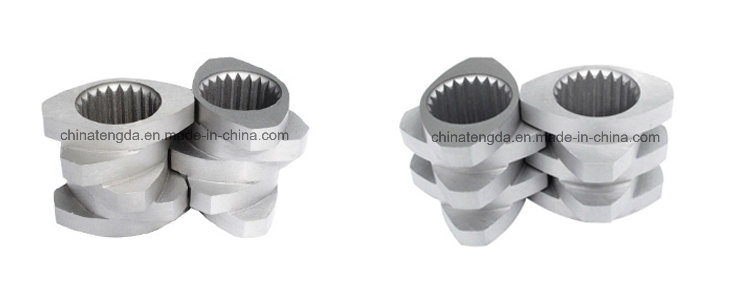
Kneading elements are mostly used for dispersive mixing, but they are also used for distributive mixing processes. They consist of kneading discs with a certain thickness. Like the conveying elements there are several parameters by which the kneading elements are characterized. These parameters include the number of flights, the staggering angle between sequential kneading discs (in degrees), direction (clockwise or counter-clockwise) and the element length (in millimeters) .Â
Backward-pumping elements
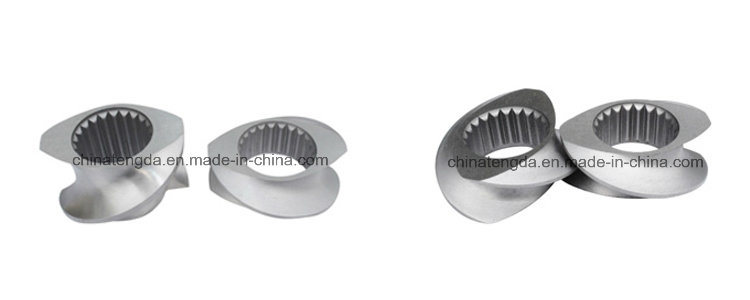
Backward-pumping elements give a good distributive mixing and as the name implies they transport the product upstream instead of downstream. They are used for performing a more longitudinal homogenization.
Other screw elements
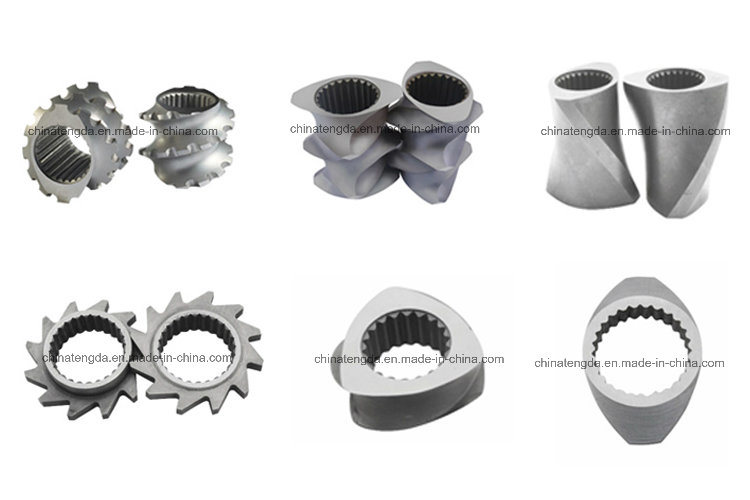
Product Show
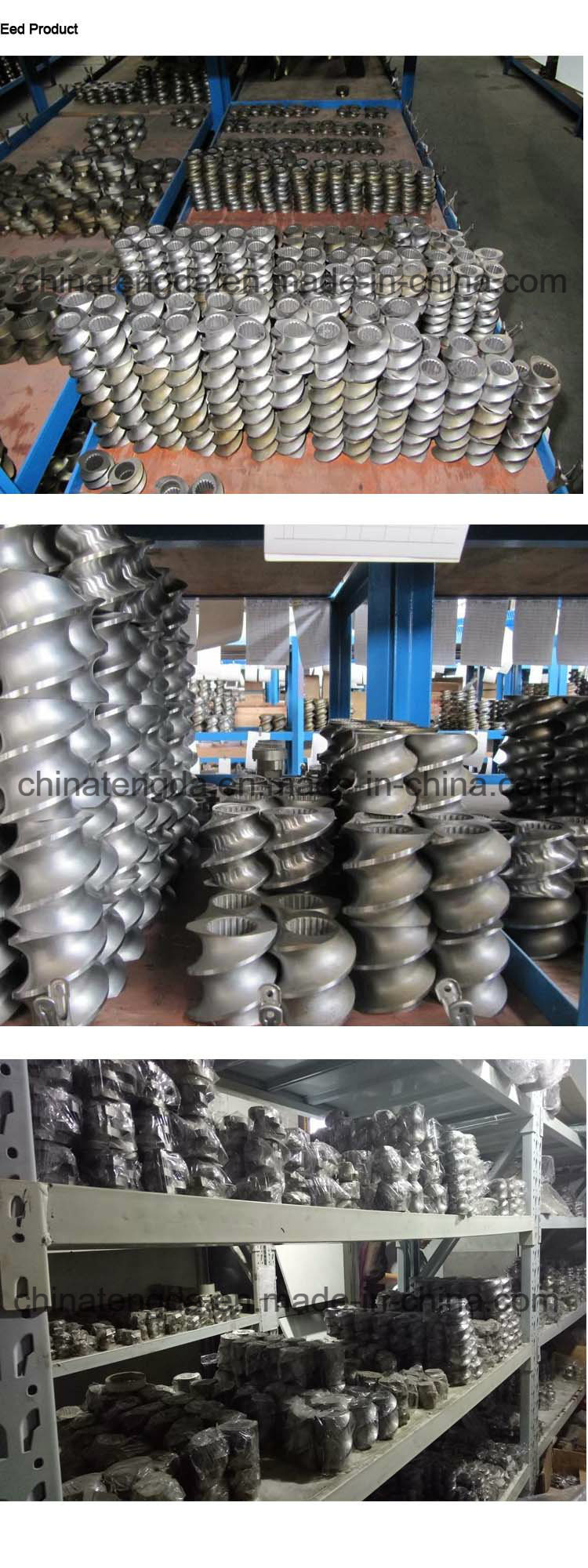
Our company
Tenda, headquartered in Nanjing, China, is a global manufacturing and trading company in the field of high performance plastics and rubber processing equipment, extrusion solutions, masterbatch and compounding, etc. Its unit Nanjing Tengda Extrusion Company is a professional manufacturer of twin screw extruder, single screw extruder, two stage extruder and its related auxiliaries. We tailor solutions from raw materials, materials processing equipment, to injection for different customers. Each Tenda's solution is designed, manufactured and commissioned by experienced teams of professionals engineers and after sales staffs.
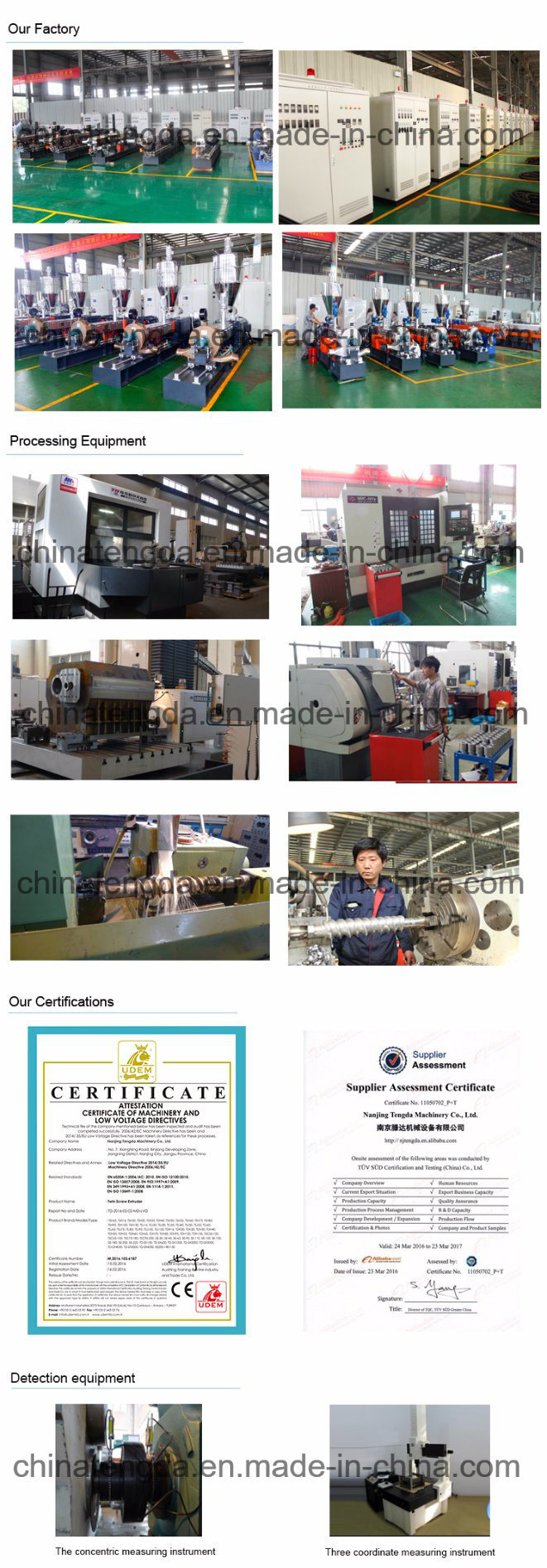
Â
Â
Â
Â
About product
Different types of screw elements can be used in a twin screw extruder. Generally there are four major types of screw elements, namely conveying elements, kneading elements, backward-pumping elements and mixing elements. For each type there are many different subtypes.
Conveying elements

The geometry of the conveying elements enables a good transport of the product through the extruder. Each conveying element is characterized by its number of flights, its length in millimeters, and its pitch. The pitch is defined as the axial length in millimeters, required for a complete thread. Conveying elements with a large pitch have a greater conveying effect than those with a small pitch. These elements are used to forward the material e.g. at feed openings, in order to avoid that pressure increases excessively at the openings.
Kneading elements

Kneading elements are mostly used for dispersive mixing, but they are also used for distributive mixing processes. They consist of kneading discs with a certain thickness. Like the conveying elements there are several parameters by which the kneading elements are characterized. These parameters include the number of flights, the staggering angle between sequential kneading discs (in degrees), direction (clockwise or counter-clockwise) and the element length (in millimeters) .Â
Backward-pumping elements

Backward-pumping elements give a good distributive mixing and as the name implies they transport the product upstream instead of downstream. They are used for performing a more longitudinal homogenization.
Other screw elements

Product Show

Our company
Tenda, headquartered in Nanjing, China, is a global manufacturing and trading company in the field of high performance plastics and rubber processing equipment, extrusion solutions, masterbatch and compounding, etc. Its unit Nanjing Tengda Extrusion Company is a professional manufacturer of twin screw extruder, single screw extruder, two stage extruder and its related auxiliaries. We tailor solutions from raw materials, materials processing equipment, to injection for different customers. Each Tenda's solution is designed, manufactured and commissioned by experienced teams of professionals engineers and after sales staffs.

Â
Â
Â
WHAT ARE TRICONE DRILL BITS USED FOR?
Tricone bits, first created during the Great Depression, represented a significant leap forward in drilling technology. Tricone drill bits are the go-to solution for almost any well digging, from everything to simple water wells to industrial scale oil extraction. Tricone bits come in several different varieties, and can deal with a wide range of different rock formations. Most tricone bits are either Mill Tooth bits, or TCI bits (TCI stands for Tugnsten Carbide Insert), and there is an ideal tricone bit for soft, medium, or hard rock formations. It is important to know the type of formation you are drilling in when selecting a drill bit.
TRICONE DRILL BITS FOR SOFT ROCK FORMATIONS
Soft rock formations consist mainly of sand, clay, limestone or shale and are ideal for drilling with Mill Tooth Tricone bits. When working with soft formations you can use either sealed bearing or open bearing mill tooth tricone bits, depending on the scope and duration of your project. Sealed bearing tricone bits are longer lasting, but generally more expensive due to the precision work required to protect the bearings. Open bearing bits, on the other hand, are not as well protected and will wear out more quickly, however they are cheaper to manufacture. Tricone bits designed for soft rock generally have longer protruding teeth, [A" shaped teeth, or chisel shaped buttons. In all cases the teeth will be more widely spaced for tricone bits that are designed with soft formations in mind.
TRICONE BITS FOR MEDIUM ROCK FORMATIONS
If you`re drilling in calcites, dolomites, hard limestones, and some hard shale you`ll need a tricone bit designed for medium rock formations. You may want a TCI Tricone bit. To better understand why tungsten carbide is ideal it`s useful to know about its properties. First discovered in 1927, Tungsten carbide is an exceptionally strong and hard material, this allows it to withstand higher speeds for more rapid drilling. Additionally tricone TCI bits are much more capable at absorbing the significant amounts of heat generated without damaging the tricone drill bit. Medium formation bits have teeth that are far closer together than what you see with soft formation drill bits. Additionally the teeth are less protruding, although they may still come in a similar range of shapes.
TRICONE BITS FOR HARD ROCK FORMATIONS
Hard rock formations are hard and abrasive formations usually made up of hard shale, calcites, mudstones, chert, pyrite, granite, quartzite, and cherty lime stones. The difficulties of drilling in this material make a TCI tricone bit all but mandatory. The exceptional hardness and strength of TCI [buttons" for the drill bits allow them to endure very difficult drilling conditions. As with all tricone bits there is an option between sealed bearing and open bearing. Sealed bearing bits are considerably more protected from wear and tear and therefore suitable for much more use before being replaced. Gauge protection can also significantly increase the lifespan of a tricone drill bit. Bits designed for hard formations continue the trend of less protruding teeth placed closer together. The teeth will be very short and placed very closely together. This results in a much slower drilling speed than you would get with medium or soft formation drill bits, however if you are drilling through hard rock strata you don`t have much choice.
TRICONE BITS ARE IDEAL FOR SOFT, MEDIUM, AND HARD FORMATIONS.
Hopefully the above information has given you an idea of which tricone bit is ideal for the various rock formations you may have to contend with. For particularly advanced or ambitious projects you will want to carefully consider the type of tooth, additional kinds of seals, the importance of gauge protection, and estimated duration of the project in addition to the rock formation.
Drilling bit for sale,drilling bit for Africa Water Well Drilling Rig With Good Quality.
Drilling Bits And Tri-Cone Bit,Rock Bit For Hard Rock Drilling,Api Drilling Bit For Rock Gas,Geothermy Water Well Drilling Bit
Henan YK Prospecting Machinery Co., Ltd , https://www.yikyuirig.com
